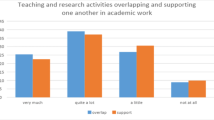Abstract
Based on a survey of 243 New England colleges and universities, this article is designed to contribute to an understanding of the current and projected roles of institutional research and to discuss the implications of these roles for the education and training of future institutional researchers. Results from this study reveal the strongest relationships between the institution's size and the scope of the institutional research function, the reporting relationship, and the size and the qualifications of the institutional research staff. Multivariate analysis identifies the size of the institutional staff and the qualifications of the institutional director as significant predictors of involvement in planning and policy studies. These data indicate the need to enhance the presence, qualifications, and level of activity of institutional researchers in order to enhance the contribution to institutional decision making particularly among small institutions. Recommendations are offered to achieve these goals and prepare the institutional research profession for the challenges confronting higher education now and in the 21st century.
Similar content being viewed by others
REFERENCES
Billups, F. D., and DeLucia, L. A. (1990). Integrating institutional research into the organization. In P. T. Terenzini and E. E. Chaffee (series eds.) and J. B. Presley (vol. ed.), New Directions for Institutional Research: No. 66. Organizing Effective Institutional Research Offices (pp. 93-102). San Francisco: Jossey-Bass.
Chan, S. S. (1993). Changing roles of institutional research in strategic management. Research in Higher Education 34(5): 533-549.
Clyburn, M. (1991, May). An Investigation of Institutional Research in Small, Private Colleges in the Southeastern United States. Paper presented at the annual forum of the Association for Institutional Research, San Francisco, CA (ERIC Document Reproduction Service No. ED 336 030).
Kinnick, M. K., and Ricks, M. F. (1993). Student retention: Moving from numbers to action. Research in Higher Education 34(1): 55-69.
Matier, M. W., Sidle, C. C., and Hurst, P. J. (1994, May). How It Ought to Be: Institutional Researchers' Roles as We Approach the 21st Century. Paper presented at the annual forum of the Association for Institutional Research, New Orleans, Louisiana.
Peterson, M. W. (1985). Institutional research: An evolutionary perspective. In P. T. Terenzini and M.W. Peterson (series eds.) and M. W. Peterson and M. Corcoran (vol. eds.), New Directions for Institutional Research: No. 46. Institutional Research in Transition (pp. 5-15). San Francisco: Jossey-Bass.
Presley, J. B. (1990). Putting the building blocks into place for effective institutional research. In P. T. Terenzini and E. E. Chaffee (series eds.) and J. B. Presley (vol. ed.), New Directions for Institutional Research: No. 66. Organizing Effective Institutional Research Offices (pp. 103-106). San Francisco: Jossey-Bass.
Saupe, J. L. (1990). The Functions of Institutional Research (2nd ed.). Tallahassee, Florida: Association for Institutional Research (ERIC Document Reproduction Service No. ED 319 327).
Terenzini, P. T. (1993). On the nature of institutional research and the knowledge and skills it requires. Research in Higher Education 34(1): 1-10.
Terenzini, P. T. (1995, Fall/Winter). Evolution and revolution in institutional research. Air Currents 33: 7.
Volkwein, J. F. (1990). The diversity of institutional research structures and tasks. In P. T. Terenzini and E. E. Chaffee (series eds.) and J. B. Presley (vol. ed.), New Directions for Institutional Research: No. 66. Organizing Effective Institutional Research Offices (pp. 7-26). San Francisco: Jossey-Bass.
Rights and permissions
About this article
Cite this article
Delaney, A.M. The Role of Institutional Research in Higher Education: Enabling Researchers to Meet New Challenges. Research in Higher Education 38, 1–16 (1997). https://doi.org/10.1023/A:1024907527884
Issue Date:
DOI: https://doi.org/10.1023/A:1024907527884



